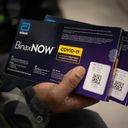Rapid nasal COVID tests feared to be returning false negatives

There appears to be yet another layer to America's coronavirus testing chaos: People may not test positive on rapid nasal tests until after they're infectious, which would make the tests an unreliable measure of whether it's safe to gather.
The big picture: Rapid tests have been hailed as a way to weather the Omicron surge without mass disruption to everyday life. But they've been in short supply for weeks, and now new research — along with loads of anecdotal evidence — suggests there may be significant limitations to their usefulness with this variant.
Driving the news: A small preprint study released Wednesday found that, among a case study of 30 people who took nasal rapid antigen tests and saliva PCR tests at the same time, four of them transmitted the virus following a false negative rapid antigen test.
- The median time between their first positive PCR test and their first positive antigen test was three days.
- "Based on viral load and transmissions confirmed through epidemiological investigation, most Omicron cases were infectious for several days before being detectable by rapid antigen tests," the authors conclude.
- "The policy implication is that rapid antigen tests may not be as fit-for-purpose in routine workplace screening to prevent asymptomatic spread of Omicron, compared to prior variants, given the shorter time from exposure to infectiousness and lower infectious doses sufficient for transmission," they add.
State of play: The study builds on emerging evidence that saliva swabs may be better for detecting Omicron than nasal swabs.
- We should "start thinking about testing saliva, although as with so many things and omicron, we are having to make important decisions in the absence of what would count as a good evidence base," emailed Harvard epidemiologist Bill Hanage.
Our thought bubble: Almost everyone I talk to professionally or personally knows someone who tested negative on a rapid antigen test but positive on a PCR test (the gold standard), or who tested negative on rapid tests while symptomatic for days before getting a positive test, or who attended a gathering where someone had a negative rapid test ahead of time but went on to infect others with COVID.
- Social media posts are circulating that instruct people to swab their throats instead of their noses.
- But the data on how common stories like these are — or whether swabbing throats instead of noses even works on the currently approved tests — is scarce.
- "Early data suggests that antigen tests do detect the Omicron variant but may have reduced sensitivity," the FDA wrote late last month in an update on the impact of Omicron on antigen testing.
What they're saying: "We have seen far too many people who are clinically ill who are in their third and fourth day of negative antigen tests but test positive by PCR," said Michael Osterholm, director of the Center for Infectious Disease Research and Policy at the University of Minnesota.
- "So the question is, how often does that happen? What does that mean?”
The bottom line: If you can get ahold of a rapid test, and you test negative on it, that may still not mean it's safe to visit your elderly grandparents or that you can go to work without worrying about spreading the virus.
- "That's A plus B equals C," Osterholm said. "A, a shortage of tests. B, they may not be that accurate. C, mass confusion."